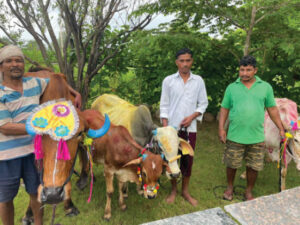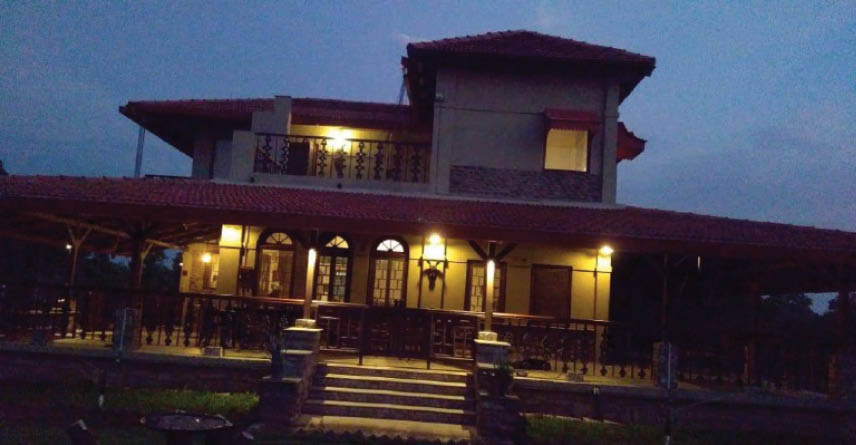Redevelopment was fast catching up in Nagpur. Once a peaceful area dotted with old bungalows with huge gardens, mostly owned by Parsis, New Colony suddenly became a hub of building activity. Old bungalows were being sold since these were no longer feasible to maintain. Families had shrunk in number, so living in huge places requiring a lot of maintenance due to age, was not practical.
One such beautiful structure, known as ‘Empress Mills Director’s Bungalow’ – a landmark in New Colony – was put up for sale. Empress Mills was the first Tata venture, which provided a platform for them to expand their business. The Director’s Bungalow was residence to numerous General Managers over the years as also to various Tata VIPs visiting Nagpur. Right from Naval Tata to Ratan Tata – they lived here while visiting Nagpur in relation to their work at the Empress Mills, which was impeccably maintained, and was a beautiful structure with clean lines – a vision to behold.

Alas, when the Empress Mills shut down in 1986, we knew its days were numbered too. For many years, it stood there as a mute testimony to the glorious days of Empress Mills. Rumour mills were abuzz that the Empress Mills Director’s bungalow was sold. The new owners resided there for a few years but found it difficult to maintain, so it was finally sold to a builder for redevelopment.
Shiraz, who lived next door was perturbed with the news. He had grown up seeing this majestic house and spent countless happy hours admiring its old-world charm. He was loathe to see it being demolished and replaced with with an ungainly high-rise usurping its place. Not the one to bemoan for an inevitable event which was likely to take place, he went across and made a deal. He bought the old mosaic tiles and the artistic grills, employing expert masons to carefully remove these, salvaged them carefully for future use.
He then set his sights on another Parsi bungalow right in front of his house owned by mining magnate Byramji, who had built and occupied it till his passing. His kin had put it up for sale and Shiraz knew there would be gems here which could be salvaged, reused and restored to their old glory. He bought all the old doors and windows, an imposing and regal wooden staircase and an iron spiral staircase going up to its terrace!
His plan was to build a farmhouse at his farm in Chourbauli (65 kms from Nagpur), which shared its boundary with the Mogarkasa Bird Sanctuary. The Safari gates – both in Silari (Maharashtra) and Turia (MP) of the famous Tiger Reserve – Pench National Park – are just 20 to 30 minutes away.
This strategic location was ideal for a homestay – all the salvaged material was reused and took a new avatar in the form of ‘Vanam’. Restoration and adaptive use was the mantra. Vanam was built keeping in mind the use of the old tiles, doors, windows, grills and staircase. The heritage tiles were meticulously refitted, juxtaposing the old with the new. Walls were made keeping in mind the various old doors and windows measurements. The old grills made their appearance on the huge open verandahs. The regal wooden staircase looked majestic in the hall, going up to the first floor. The old circular iron staircase was fitted at the back, to reach the terrace and water tanks.

The old-world charm was evident though the kitchen and bedrooms had all the modern amenities. Old furniture from their village house in Gujarat was transported to Vanam, occupying a pride of place. Thus, Vanam displayed distinct heritage detailing, married with creature comforts of modern luxury. The crowning glory was the old heavy cast iron gate which was installed at the entrance of the farm. Belonging to the erstwhile Empress Mills, with the Mills emblem engraved on each gate, it looks imposing.
Shiraz ensured to make Vanam sustainable and environment friendly, installing an innovative rain-water harvesting system. There’s a Gobar gas plant and an ancient quaint-looking chulla or stove, which keeps the cooked food warm through the day. No plastics, pesticides or synthetic manure is used, only cow dung and manure obtained from vermicomposting is utilized. Repellants prepared of jungle herbs and neem are used as herbicides. The property also boasts of a 5-acre teak forest planted, 15 years ago.
Wild animals have been known to visit the farm, with various displayed photographs and a cast made from the pug marks, bearing testimony to that. To make up for human encroachment into animal territory, two water holes were dug up, which have proven very useful for animals and birds, especially during the harsh summers. Salt licks are also left at strategic places for animals.
All rural festivals are celebrated with much fanfare, maintaining the regional ethos for visitors to experience. This, combined with a comfortable, homely stay and a visit to the Pench National Park, Vanam is the place to visit. Farm fresh vegetables and food cooked on wood satisfies your taste buds, coupled with a generous host who will make sure your stay will be a memorable one!
(Courtesy: Havovi Govadia)
- દિકરી એટલે બીજી માં… - 20 April2024
- નાગપુરની બાઈ હીરાબાઈ એમ. મુલાનદરેમહેરનો ઇતિહાસ - 20 April2024
- વિશ્વ ભારતી સંસ્થાન દ્વારા રતિ વાડિયાનુંસન્માન કરવામાં આવ્યું - 20 April2024
